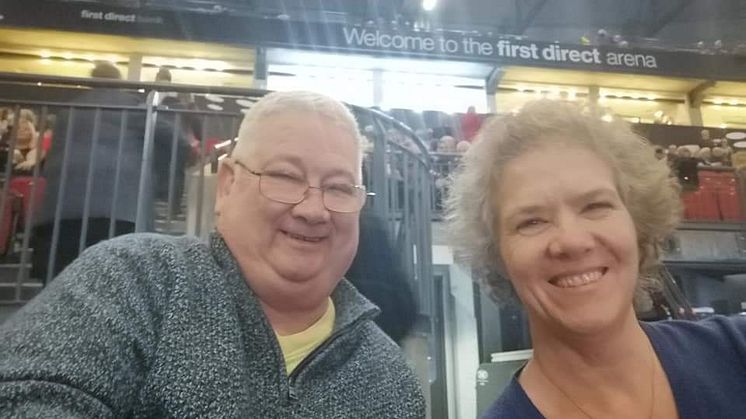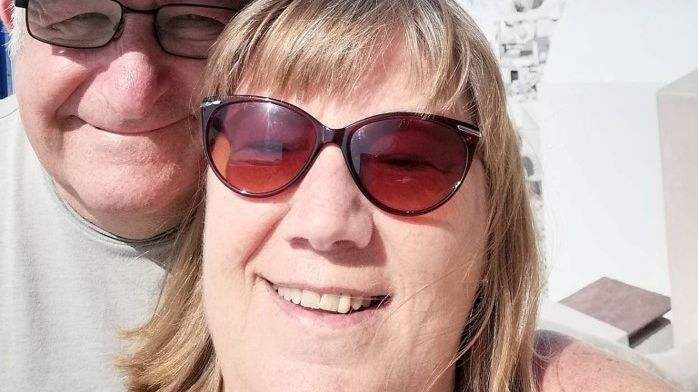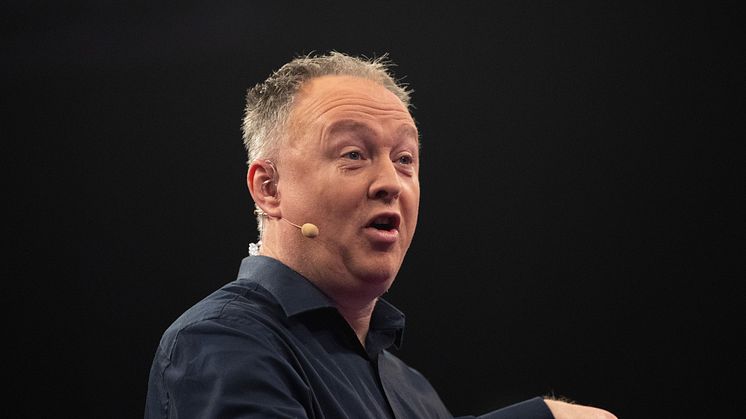
Press release -
Act now to stop ‘avoidable and unnecessary disability’ says first report into the impacts of Covid-19 on stroke survivors
Delayed calls to 999 due to concerns around Covid-19, unavailable treatments and cancelled rehabilitation therapies caused by the pandemic has left tens of thousands of stroke survivors with avoidable, unnecessary disability, exacerbated mental health problems and has taken a devastating toll on stroke survivors and their families. The Stroke Association today calls for immediate actions from governments and local health systems across the UK to stem a ‘rising tide’ of demand on the NHS and UK health services that could ‘take years to solve’ if left unchecked. With enough physio, occupational and speech and language therapies and mental health support, stroke survivors can recover, but only if governments and local health systems act now, according to the first report into the effects of Covid-19 on stroke survivors by the charity.
The Stroke Association’s ‘Stroke recoveries at risk’ report, based on the experiences of 2,000 stroke survivors and carers, calls for:
- All community rehabilitation, such as physiotherapy, speech and language therapy and occupational therapy to meet national clinical guidelinelevels to ensure all stroke survivors can access the vital support they need and should be receiving.
- Stroke teams to follow up withallstroke survivors who had a stroke this year to make sure they have not been abandoned and are in line to receive the support they need to help them recover and cope with the effects of their stroke.
- Health and care systems to prioritise increasing the provision of and access to mental health services to stem the significant emotional and psychological effects of experiencing a stroke, which have only been made worse during the pandemic period with thousands of people left extremely anxious and isolated.
- Governments and local authorities should provide adequate support to carers to cope with the additional pressures of Covid-19 to ease the burden of constant, round-the-clock caring for loved ones with even less support than normal.
There are 1.2 million stroke survivors living in the UK and over 100,000 strokes every year, making stroke the leading cause of adult disability. The Stroke Association estimates that there are over 35,000 stroke survivors who had a stroke during the pandemic and who require more support.
Although NHS stroke services remained open throughout, the charity’s new ‘Stroke recoveries at risk’ report shows that stroke care is on the precipice of a national crisis and risks thousands of stroke survivors’ hard earned recoveries slipping backwards. As outlined in the Stroke Association’s Lived Experience of Stroke report (Oct 2019)(i), the level of care, rehabilitation and mental health support available was already letting down thousands of stroke survivors, unable to cope with even the pre-pandemic levels of demand. When health and care systems begin returning services to normal, therapy waiting lists will be swamped with a backlog of thousands of stroke survivors. The charity’s report shows that there is unmet need and calls on stroke teams to follow up with stroke survivors who had a stroke this year. This is in order to get everyone in line to receive the support they need and avoid people being lost or abandoned by the system.
Juliet Bouverie, Chief Executive of the Stroke Association says: “Strokes didn’t stop because of the pandemic. Despite the tireless efforts of frontline clinicians who have gone to herculean efforts to maintain services under extremely difficult conditions, some treatments still became unavailable and most stroke aftercare ground to a halt. This means more stroke survivors are now living with avoidable, unnecessary disability. Stroke is a brain attack that affects 100,000 people a year – killing thousands and leaving others with complex and severe disability. Recovery is tough, but with the right specialist support and a ton of courage and determination, the brain can adapt after stroke.
“People under-estimate the trauma associated with the sudden life-changing experience of having a stroke. The degree of support that stroke survivors need to reframe and adjust to a new normal, often needing to cope with lifelong disability, is a lot more than people realise. We need to see increased access to mental health support, so stroke survivors can cope with their mental health issues, made worse by lockdown and ongoing uncertainty.”
These calls are a response to new findings from the Stroke Association that paint a picture of stroke patients struggling to recover and suffering more severe complex disability, as a direct result of the Covid-19 and the lockdown.
Key findings from the report:
- -More than a third stroke survivors (39%) who had their stroke this year reported having not received enough rehabilitation, including physiotherapy(ii). This is backed up by stroke doctors, a third of whom (33%) reported reduced quality and quantity of rehabilitation on their ward(iii).
- -More than half (53%) of stroke survivors have had therapy appointments or home care visits cancelled or postponed(ii).
- -Seven in ten (68%) stroke survivors have felt more anxious and depressed(ii).Lockdown has exacerbated problems for the almost one million stroke survivors who live with a mental health problem caused by stroke(iv). Respondents told us they felt extremely depressed and lonely and had been going days without social contact. Calls to the Stroke Helpline have become increasingly distressed as many stroke survivors struggle to cope with isolation, the tasks of daily living and the pandemic’s financial effects.
- -Over half (56%) of carers feel overwhelmed and unable to cope, particularly those caring for someone who had a stroke this year (72%)(ii).
David and Lee Muhl from Leeds have experienced the impact first hand. Lee has been a carer for her husband David for a number of years due to another illness. However, David, 59, had a stroke in February 2020, which affected the whole of his right side and also his speech.
David said: “I could walk a little before my stroke with crutches, but now I can’t walk at all without my frame. The movement in my arm is coming back but I still can’t write or pick up a cup. Mentally, I get very emotional and very very tired.”
Due to Covid-19, visits from statutory care were cancelled and Lee has had to take on even more caring responsibilities.
Lee said: “David came home from hospital on 28 February and we were told we’d have carers attending for six weeks to assess his needs, before we’d either be referred to the community team or need to pay for private care ourselves. However, it was only a couple of weeks before the visits were stopped due to Covid-19.
“When the visits stopped, I had to take over that responsibility. I work as a civil servant and initially it was a struggle juggling work, although my employers were very supportive. I felt guilty leaving to go to work every day but at that point I didn’t have a choice.”
Juliet continues: “We need a big push to get rehabilitation, mental health services and carer support back on their feet. The right treatment and the right care makes the difference between days in hospital and months; the right rehabilitation makes the difference between walking again and needing care for the rest of your life. One stroke with no support risks an array of future problems. Without physiotherapy, a stroke survivor will have more falls, be more likely to catch pneumonia, will have to call an ambulance and spend more time back in hospital in a bed that a Covid patient could need.
“This generation of stroke survivors can rebuild their lives, but only if governments and health services act quickly and with genuine commitment. Neither current levels nor pre-pandemic levels of support were good enough. Without a change, there is going to be a stroke care crisis that will put massive pressure on the health and care services. We’re going to see a rising tide of demand for rehabilitation therapies that will take years to solve and could end in tragedy for tens of thousands. This means having another stroke, further disability or death. Our report offers clear, achievable recommendations for policy makers across the UK. We need to put a clear message to the people in power and you can do this by signing our open letter.”
Prof. Rustam Al-Shahi Salman, President of the British Association of Stroke Physicians (BASP) and professor of clinical neurology at the University of Edinburgh says: “During the pandemic there were significant changes to the way stroke services ran, as we’d all expect. We were worried about the reduction in the number of people presenting to hospital with mini-stroke and stroke. Covid-19 also affected the treatment and rehabilitation available and the speed with which they could be delivered. People who survived strokes that occurred during Covid-19 could benefit if the recommendations of the ‘Stroke recoveries at risk’ report are implemented. The lessons that we have learned must inform how stroke services respond if a second surge of Covid-19 occurs.”
The Stroke Association are calling on the governments and health and care leaders to implement the recommendations laid out in the report in the best way for stroke survivors. The open letter is available to sign here: www.stroke.org.uk/covid-letter
The report and executive summary can be found here: www.stroke.org.uk/covid-report
Topics
- Stroke strikes every five minutes in the UK and it changes lives in an instant.
- The Stroke Association is a charity working across the UK to support people to rebuild their lives after stroke. We believe that everyone deserves to live the best life they can after stroke. From local support services and groups, to online information and support, anyone affected by stroke can visit stroke.org.uk or call our dedicated Stroke Helpline on 0303 3033 100 to find out about support available locally.
- Our specialist support, research and campaigning are only possible with the courage and determination of the stroke community and the generosity of our supporters. With more donations and support, we can help rebuild even more lives.
- You can follow us on Twitter, Facebook and Instagram.



